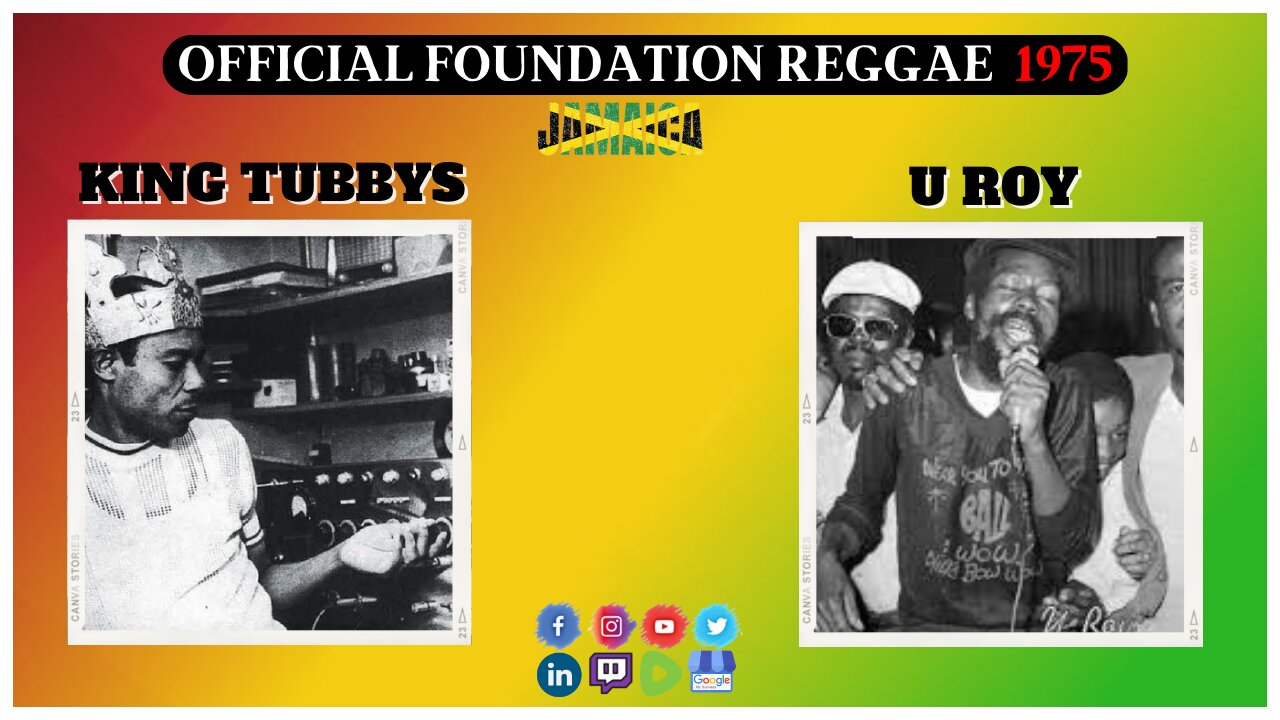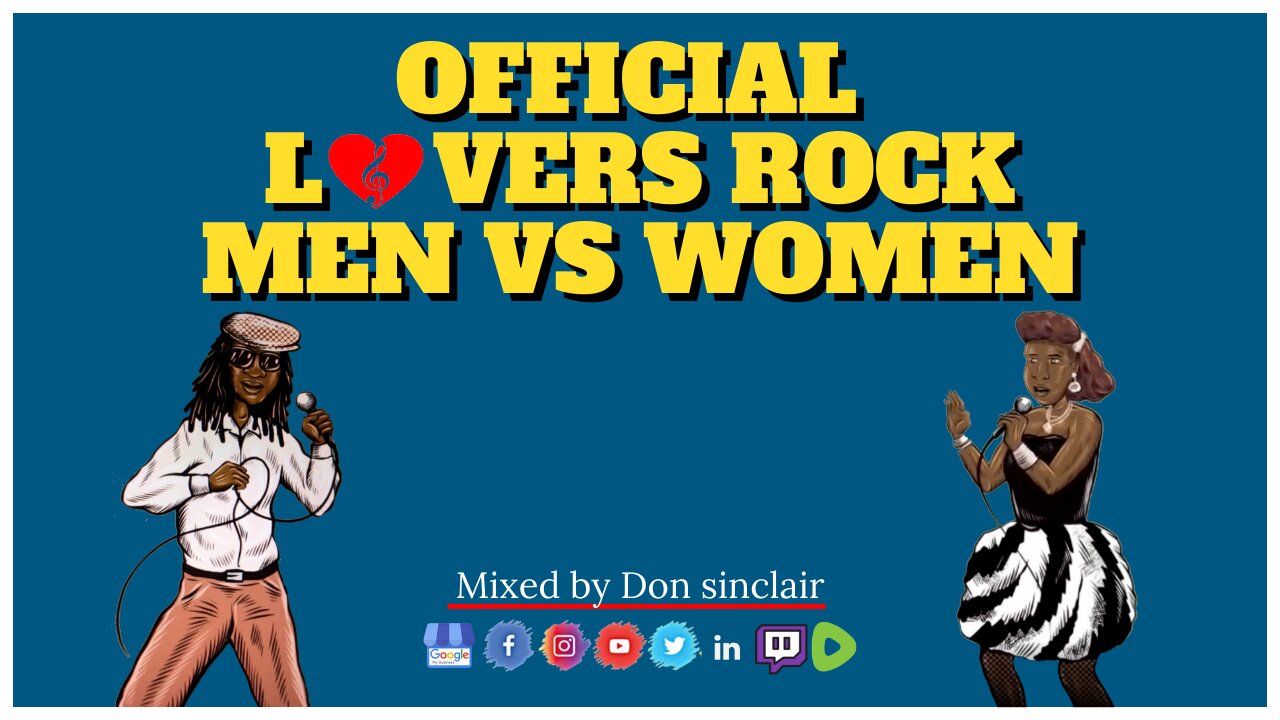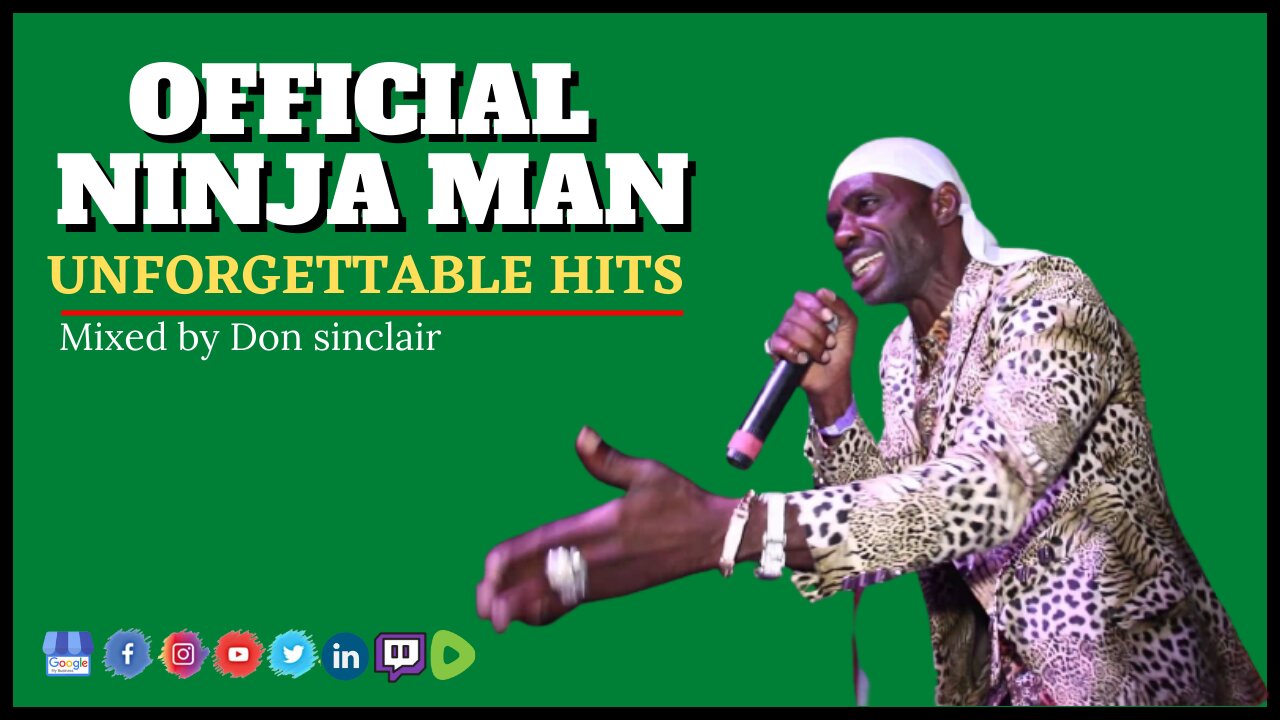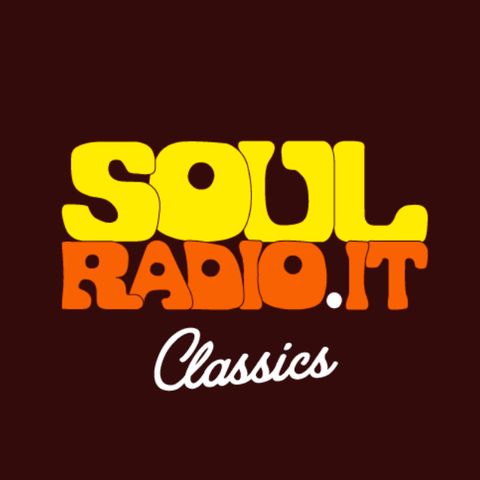Official Reggae Royalty Dennis Brown Birthday Bash ft Jr Reid & Yami Bolo Live & Direct 1997
One of Jamaica's most beloved and prolific artists, the late Dennis Brown has left behind a slew of classic songs and myriad hits, a rich musical legacy born of a career that spanned over 30 years. Born Dennis Emmanuel Brown in Kingston, Jamaica, in 1957, his childhood home virtually destined him for a future in the music industry. He grew up on Orange Street, the heart of the island's music scene, with most of the major recording studios a mere stone's throw away. As the stars and future hitmakers paraded by day and music pumped out of the studios, the child could not help but be entranced. It was truly serendipitous that Brown himself had a voice that would set the studios ablaze. It didn't take long for the producers to discover his talent and by the time he was 11, the youngster had a first hit to his name, with a cover of the Impressions' "No Man Is an Island." It was the beginning of a successful, but not exclusive, partnership (Brown also scored with "If I Had the World" for producer Prince Buster). However, Dodd was responsible for Brown's debut album, 1970's No Man Is an Island, and its follow-up the next year, If I Follow My Heart.
Now entering his teens, the singer was ready to start making the studio rounds on a regular basis, cutting songs with a clutch of different producers. The album Super Reggae & Soul Hits gathers some of his work during this period and features a mix of superb, if lightweight, covers alongside a number of self-penned classics, all cut with producer Derrick Harriott. 1975's Best Of gathered a similar selection of material recorded for Joe Gibbs earlier in the decade. In 1972, the 16-year-old entered Gibbs' Duhaney Park studio and recorded the song that later established his international reputation, "Money in My Pocket." However, it wasn't Gibbs himself who oversaw this session, but a young engineer/producer who had replaced the recently departed Lee Perry. Twenty-year-old Niney "the Observer" Holness had stunned the island two years earlier with his seminal "Blood & Fire" single, a roots classic. Now he was presented with a teenager best known for his sweet ballads and silky lovers cuts. Regardless, the two young men immediately clicked and by 1973, Brown was recording exclusively with Holness. Their work together virtually defies belief, as hits rained from the sky and the pair redefined the roots genre in their own image.
Junior Reid found himself in a difficult spot when he joined Black Uhuru in 1986. He replaced Michael Rose, who had become quite popular as a longtime Uhuru contributor. Though essentially a good vocalist, Reid's style was so close to Rose's that he didn't establish his own identity. The group also suffered compositional difficulties and personal crises during Reid's tenure. Puma Jones left and was replaced by Olafunke. They also didn't always get quality material or support from Sly and Robbie during this period. Reid departed in 1990 and began struggling as a solo artist to fulfil his considerable potential, with releases like 1991's Long Road, 1993's Big Timer, and 1996's Listen to the Voices.
International star Yami Bolo has been recording and performing "Jah-centered" cultural reggae since the 1980s. Bolo believes that he has been divinely called to make himself and his entourage revolutionary soldiers of the Almighty on a mission to spread their message of love, peace, and hope to the entire world with their performances and recordings. He is particularly interested in uplifting the youth songs that warn against violence such as "Gun War." Born Rolando McLean, Yami Bolo's earliest musical influence was church music; he began performing at age 11. He got his big chance when he hooked up with Sugar Minott and his Youth Promotion organization.
Minott was impressed by Bolo's sincerity and eventually allowed him to record special promotions for travelling DJs -- none of the many tracks he recorded with Minott was ever released. While associated with Minott, the adolescent Bolo would spend much time hanging out at Jamaican studios listening to roots beats and learning about recording. Later, Bolo performed with Stur-Mas and Third World. As an independent artist, Bolo signed with Techniques in the mid-'80s and released three singles. He then went on to cut one LP with Junior Delgado and another with Augustus Pablo before issuing the solo CD He Who Knows It Feels It for Heartbeat in 1991.
❤️💛💚
Uk's Leading Broadcast Station for more Quality Vibes Subscribe to our YouTube Channel.
Découvrir des postes
Explorez un contenu captivant et des perspectives diverses sur notre page Découvrir. Découvrez de nouvelles idées et engagez des conversations significatives
Official Foundation Reggae: King Tubby's ft U Roy Kingston Jamaica 1975
King Tubby's music career began in the 1950s with the rising popularity of Jamaican sound systems, which were to be found all over Kingston and were developing into enterprising businesses. As a talented radio repairman, Tubby soon found himself in great demand by most of the major sound systems of Kingston, as the tropical weather of the Caribbean island (often combined with sabotage by rival sound system owners) led to malfunctions and equipment failure. Tubby owned an electrical repair shop on Drumalie Avenue, Kingston, that fixed televisions and radios.
It was here that he built large amplifiers for the local sound systems. In 1961-62, he built his own radio transmitter and briefly ran a pirate radio station playing ska and rhythm and blues which he soon shut down when he heard that the police were looking for the perpetrators. Tubby would eventually form his own sound system, Tubby's Hometown Hi-Fi, in 1958. It became a crowd favourite due to the high-quality sound of his equipment, exclusive releases and Tubby's own echo and reverb sound effects, at that point something of a novelty.
King Tubby's production work in the 1970s made him one of the best-known celebrities in Jamaica and would generate interest in his production techniques from producers, sound engineers and musicians across the world. Tubby built on his considerable knowledge of electronics to repair, adapt and design his own studio equipment, which made use of a combination of old devices and new technologies to produce a studio capable of the precise, atmospheric sounds which would become Tubby's trademark. With a variety of effects units connected to his mixer, Tubby "played" the mixing desk like an instrument, bringing instruments and vocals in and out of the mix (literally "dubbing" them) to create an entirely new genre known as dub music.
Using existing multitrack master tapes—his small studio in fact had no capacity to record session musicians—Tubby would re-tape or "dub" the original after passing it through his 12-channel, custom-built MCI mixing desk, twisting the songs into unexpected configurations which highlighted the heavy rhythms of their bass and drum parts with minute snatches of vocals, horns, piano and organ.
U-Roy
Known as the Originator, U-Roy wasn't the first DJ, nor even the first to cut a record, but he was the first to shake the nation and he originated a style so distinctly unique that he single-handedly changed his homeland's music scene forever. Born Ewart Beckford in Jones Town, Jamaica, in 1942, he received his famous moniker from a young family member unable to correctly pronounce Ewart and the nickname stuck.
U-Roy's rise to fame was slow and took almost a decade. He began back in 1961, DJing at Doctor Dickie's Dynamite sound system. Eventually, he moved on to the Sir Mike the Musical Thunderstorm outfit, and then in 1968 to the Sir George the Atomic sound system. The DJ was then lured away by Coxsone Dodd; however, soon tiring of playing second fiddle to longtime veteran King Stitt, he returned to Sir George. Around this same time, he met up with another royal figure, King Tubby, and then worked as a disc cutter at Duke Reid's studio. The mechanic was just beginning the musical experiments that eventually led him to develop dub, and at the moment he was giving his proto-dub experimental discs to a handful of his favourite DJs. The following year, King Tubby launched his own Hi-Fi sound system and brought in U-Roy as his top DJ. By then, the DJ had established himself as one of the premier talents of the sound system scene. Producer Keith Hudson was the first to recognize the possibilities and took U-Roy into the studio in late 1969 to cut the song "Dynamic Fashion Way." However, the tape lay in the studio while the producer went off on a trip to the U.S. and the DJ went off to try his luck elsewhere. Lee Perry paired U-Roy with Peter Tosh and recorded "Selassie," a version of Ras Michael & the Sons of Negus' "Ethiopian National Anthem." The single was originally credited to the Reggae Boys and on its subsequent reissue, under the title "(Earth's) Rightful Ruler," it was then credited to Peter Tosh and Hugh Roy, a spelling the DJ would adhere to for the next several years.
❤️💛💚
Uk's Leading Broadcast Station for more Quality Vibes Subscribe to our NEW Platform at Rumble. com for all our latest videos.
(((( █▬█ █ ▀█▀ Subscribe, █▬█ █ ▀█▀ Like & Comment ))))
https://rumble.com/v2c1xry-off....icial-foundation-reg
Official Reggae Royalty Strictly Smiley Culture Tribute [MUSIC MIX]
David Victor Emmanuel better known as Smiley Culture was a British reggae singer and DJ known for his 'fast chat' style. During a relatively brief period of fame and success, he produced two of the most critically acclaimed reggae singles of the 1980s
Emmanuel was raised in Stockwell, south London, and was a son of a Jamaican father and a Guyanese mother. He was educated at Tulse Hill School. His 'Smiley' nickname was gained due to his method of chatting up girls at school – he would ask them for a smile. Prior to his recording career, he worked as a DJ with many of London's reggae sound systems, most often with the Saxon Studio International system, where he met and worked with a number of other reggae artists, including Maxi Priest, Papa Levi and Tippa Irie.
Signed to the London-based reggae record label Fashion Records, his first single "Cockney Translation" (1984) was a Jamaican's guide to the East End dialect – '"Cockneys have names like Terry, Arthur and Del Boy/We have names like Winston, Lloyd and Leroy". The song mixed cockney dialect with London's version of Jamaican patois, translating between the two. Simon Reynolds has often cited this song in his writings, arguing that it presaged the creation of a new hybrid accent in which white East Londoners would adopt many terms of black origin. The song's lyric was later used in schools as an example of how immigration has affected the English language. Smiley Culture popularised the 'fast chat' style of deejaying that had originated with Jamaican deejays such as Ranking Joe and was developed further by British toasters, particularly those on the Saxon sound system such as Peter King.
Emmanuel had chart success with his next single, "Police Officer", released towards the end of 1984. This was the supposedly autobiographical tale of how Emmanuel was arrested for the possession of cannabis, but then let off in return for an autograph when the policeman recognised him as a famous reggae artist. In spite of the subject matter – and possibly because mid-1980s radio station bosses in the UK did not understand the terms "ganja" and "sinsemilla" – the single was a Top 20 hit, selling 160,000 copies, and earned Emmanuel two appearances on BBC's flagship music programme, Top of the Pops. The record, although humorous, did have a serious aspect, in that it highlighted the way black people believe they are unfairly treated by the police. He recorded a session for Janice Long's BBC Radio 1 show in December 1984 and was featured on the covers of Echoes, Record Mirror, and the NME in early 1985. The success of "Police Officer" prompted a re-release of "Cockney Translation". It picked up considerable airplay on BBC Radio One and sold over 40,000 copies in total, but only reached the lower end of the UK Singles Chart. His success led to an appearance at the Reggae Sunsplash festival in Jamaica in 1985.
After this, he signed to major label Polydor, but his work for them – including the album Tongue in Cheek, and the accompanying single "Schooltime Chronicle" – did not replicate the chart success of "Police Officer". He also hosted the Channel 4 television show Club Mix in 1986 and 1987.
In 1986, Emmanuel made a cameo appearance in the film Absolute Beginners. He was also featured in a television advertising campaign for online accounts by NatWest in 1986.
Culture has been identified as a major influence by later black British musicians such as DJ Luck and MC Neat, and Roots Manuva, the latter describing him as a "Britrap pioneer". "Cockney Translation" was one of the choices of novelist and poet Michael Rosen when he appeared on BBC Radio 4's Desert Island Discs.
In 2010, Emmanuel told The Guardian that after his career in music, he began investing in diamond mining, and by 2010 had gold and diamond mine concessions in several countries including Ghana, Uganda, Liberia, Kenya, and the Congo.
❤️💛💚
Uk's Leading Broadcast Station for more Quality Vibes Subscribe to our NEW Platform at Rumble. com for all our latest videos.
(((( █▬█ █ ▀█▀ Subscribe, █▬█ █ ▀█▀ Like & Comment ))))
https://rumble.com/v2cc8ce-off....icial-reggae-royalty
Official Reggae Royalty Strictly Garnett Silk Tribute [MUSIC MIX]
Garnett Silk was a Jamaican reggae musician and Rastafarian, known for his diverse, emotive, powerful and smooth voice. During the early 1990s, he was hailed as a rising talent, however, his career ended with his early death in 1994, while attempting to save his mother from her burning house. Even today still hailed as a reggae prodigy, Garnett is considered inspiring and a credit to reggae music.
Smith was born in Manchester, Jamaica. His musical career began at the age of twelve when he performed under the name
During the 1980s he worked as a deejay on sound systems such as Conquering Lion, Soul Remembrance, Pepper's Disco, Stereophonic, and Destiny Outernational (where he first met Tony Rebel). He recorded his first track in 1985, but it would be two years later before his first single, "Problem Everywhere" was released. An album of material from this period (Journey) was later released.
In 1988, he joined Sugar Minott's Youth Promotion label, releasing "No Disrespect", and working regularly with Tony Rebel, Smith now being billed simply as 'Bimbo'. The pair began performing as a duo around the sound systems to much acclaim. The Garnett Silk Meets the Conquering Lion: A Dub Plate Selection album dates from about this time and features a clutch of exclusive recordings the DJ cut for the sound system from the mid-1980s through the end of the decade. Rebel, a Rastafari, eventually converted Smith to his religion with the help of dub poet Yasus Afari, a close friend of both DJs.
In 1989, at the suggestion of veteran singer Derrick Morgan, Smith turned from deejaying to singing, with a recording session at Bunny Lee's studio with Rebel, including tracks recorded separately, as a duo, and with Anthony Selassie, and he began working under his real name. The Heartbeat label's Tony Rebel Meets Garnett Silk in a Dancehall Conference compiles these early Morgan-overseen recordings. The success of this session led him to continue as a singer, going on to work with producers King Tubby, Prince Jammy, and Donovan Germain, before signing a two-year contract with Steely & Clevie in 1990, recording an album's worth of songs for them. It was the production duo who decided to change his name to Garnet Silk, in reference to his smooth voice. Only one of the tracks recorded during this period, "We Can Be Together," a duet with Chevelle Franklin, was actually released at the time and discouraged by this, he returned to Manchester and threw himself into songwriting, often in partnership with an old friend, Anthony "Fire" Rochester.
Another encounter with Tony Rebel brought an introduction to Courtney Cole, owner of the Roof International label. Silk would record a plethora of songs at the producer's Ocho Rios studio, amongst them were the hits "Mama," "Seven Spanish Angels," and a cover of the Johnny Nash classic "I Can See Clearly Now". Roof International would posthumously bundle up these early singles and other material recorded at this time for the Nothing Can Divide Us album, which the VP label picked up for the US
By 1992, Silk was in Kingston in the studio with producer Bobby Digital, recording his debut album It's Growing. Split between deeply cultural themes, spiritual songs, and romantic numbers, the album went on to become one of the best-selling in Jamaica that year, and he had his first major hit single with "Hey Mama Africa" (produced by Richard "Bello" Bell) for the Star Trail label, which was Silk's first international hit and topped the reggae chart in Britain.
Over the next two years, the singer would record with most of the major name producers on the island, both on his own and in partnership with Tony Rebel. He cut a swathe of songs with King Jammy, including "Fill Us Up With Your Mercy" and "Lord Watch Over Our Shoulders." The latter track titled a 1994 compilation released by the Greensleeves label in the UK and boasts seven Jammy cuts and a clutch of hits for other producers.
❤️💛💚
Uk's Leading Broadcast Station for more Quality Vibes Subscribe to our NEW Platform at Rumble. com for all our latest videos.
(((( █▬█ █ ▀█▀ Subscribe, █▬█ █ ▀█▀ Like & Comment ))))
https://rumble.com/v2c7ms8-off....icial-reggae-royalty
Official Lovers Rock Men vs Women Classic Mix
The roots of lovers' rock lies in the last days of the rocksteady era and early days of reggae, with Jamaican and American singers such as Ken Boothe, Johnny Nash "I Can See Clearly Now"(1972) and John Holt enjoying international hits with versions of well-known love songs.
A style suited to the London reggae scene, lovers rock represented an apolitical counterpoint to the conscious Rastafarian sound dominant in Jamaica at the time, a continuation of the soulful and commonly love-themed rocksteady style, based on singers like Alton Ellis, who were not very optimistic about the rise of Rastafarian reggae.
It combined the smooth soul sounds of Chicago and Philadelphia soul with rocksteady and reggae bassline rhythms. Rooted in the sound systems of South London, the style had particular appeal amongst women and produced many female stars including Carroll Thompson. Louisa Mark was aged 14 when she had a major lovers' rock hit with her version of Robert Parker's "Caught You in a Lie" in 1975.
This spawned the distinctive young girl female sound associated with early lovers' rock. Simplicity formed in 1975 and released their first hit "To Be in Love" produced by Coxson; the B-side was the Emotions US R&B song, "A Feeling Is a Feeling". They were headhunted by Neville King who produced their UK reggae chart hit "Black Is Our Colour". This was followed by the husband and wife production team of Dennis and Eve Harris who then had a big hit with 😭. Ross's "Last Date". Dennis Harris then set up a new record label, Lover's Rock, at his South East London Studio on Upper Brockley Road along with John Kpiaye and Dennis Bovell, which gave the new genre a name.
Kofi performing at the Giants of Lovers Rock event, in 2012 South London trio Brown Sugar (including a young Caron Wheeler, later of Soul II Soul) pioneered a subgenre, 'conscious lovers, with songs such as "I'm in Love with a Dreadlocks"(1977) and "Black Pride". Others who released records in this subgenre included the Battersea songstress Winsome and Kofi. Lovers' rock became a staple of London's sound systems such as Chicken Hi-Fi, Success Sound, and Soferno B. Neil "Mad Professor" Fraser would be a key lovers' rock producer, working with Deborah Glasgow, while Bovell would produce one of the genre's biggest hits, Janet Kay's "Silly Games", which reached number 2 in the UK Singles Chart in 1979.
Although noted for the preponderance and youth of its female exponents, the new style produced male stars as well, notably Honey Boy Martin, Trevor Walters, Honey Boy, and Winston Reedy. The trend also saw the emergence of many male groups, including Tradition, The Investigators and the Birmingham group Beshara, who is 1981, had the emotive reggae chart hit "Men Cry Too".
Subsequently, numerous well-established Jamaican acts came to try their hand at the new sound. The most successful among these were Gregory Isaacs, Dennis Brown, Sugar Minott, and later Freddie McGregor. Brown's "Money in My Pocket" (#14 in 1979) and Minott's "Good Thing Going" (#4 in 1981) were both big hits in the UK Singles Chart.
Other lovers' rock singers were Junior Murvin,[5] Beres Hammond, Horace Andy, Kofi, Sanchez, Samantha Rose, and Macia Aitken. Maxi Priest gained lovers' rock hits such as "Wild World"(1988) and "Close to You"(199.
Seminal punk/rock/ska/reggae crossover band The Clash popularised the term, introducing it to a wider mainstream audience, by including a song called "Lover's Rock" on their 1979 signature double LP, London Calling.
The popularity of lovers' rock has continued, and in the 1980s the Fashion label was successful with UK audiences, and the Revue label had a chart-topper in 1986 with Boris Gardiner's "I Wanna Wake Up with You". In the 1990s, the likes of Mike Anthony, Peter Hunnigale and Donna Marie enjoyed success with the genre, and several British stars have performed at Reggae Sunsplash.
❤️💛💚
Uk's Leading Broadcast Station for more Quality Vibes Subscribe to our NEW Platform at Rumble. com for all our latest videos.
(((( █▬█ █ ▀█▀ Subscribe, █▬█ █ ▀█▀ Like & Comment )))) https://rumble.com/v2bzyf8-off....icial-lovers-rock-me
Official Ninja Man Unforgettable HITS
Ninjaman, alias Don Gorgon, (born Desmond John Ballentine on January 20, 1966, in Annotto Bay, Jamaica) is a popular dancehall deejay and actor, known for his controversial and pro-gun lyrics and his stuttering and melodramatic style. Ninjaman is currently out on bail awaiting trial for a murder that was committed in Kingston, Jamaica.
After moving from his birthplace Annotto Bay to Kingston at the age of 12, he launched his deejay career with the Black Culture Sound System at age 12 as "Double Ugly".
In 1980, he joined Killamanjaro, there got the chance to learn from established deejays Super Cat and Early B, and released his debut single as "Uglyman". Yet another name change made him the now well known Ninjaman. In 1987, Ninjaman recorded - and produced himself - his first hit single "Protection", a duet with Courtney Melody. The following years brought many prolific collaborations with producers like King Jammy, Witty, Xterminator, Philip "Fatis" Burrell, Redman, Ini Kamoze, Bobby Digital, Augustus "Gussie" Clarke, and Steely & Clevie and Henry "Junjo" Lawes. It has been said that Ninjaman comes up with all of his lyrics on the spot in the recording studio, in a freestyle manner.
His hits over the years 1989-1992, like "Murder Dem", "Permit to Bury" and "Above the Law" reinforced Ninjaman's image of a violent rude boy. One of his most infamous rivalries (besides the ongoing quarrels with Flourgon and Super Cat) was the one with Shabba Ranks, leading to a number of clashes.
In 1993, criticism of Ninjaman's violent and pro-gun lyrics arose, leading to a decline in performing gigs and chances to record.
By 1997, Ninjaman had changed his name once again, now performing gospel reggae songs as "Brother Desmond".
❤️💛💚
Uk's Leading Broadcast Station for more Quality Vibes Subscribe to our NEW Platform at Rumble. com for all our latest videos.
(((( █▬█ █ ▀█▀ Subscribe, █▬█ █ ▀█▀ Like & Comment ))))
https://rumble.com/v2bzriq-off....icial-ninja-man-unfo
Reggae Royalty Foundation Essentials: Dennis Brown Freddie Mcgregor & Cocoa Tea [MUSIC MIX]
Dennis Emmanuel Brown CD (1 February 1957 – 1 July 1999) was a Jamaican reggae singer. During his prolific career, which began in the late 1960s when he was aged eleven, he recorded more than 75 albums and was one of the major stars of lovers rock, a subgenre of reggae. Bob Marley cited Brown as his favourite singer, dubbing him "The Crown Prince of Reggae", and Brown would prove influential on future generations of reggae singers.
Dennis Brown was born on 1 February 1957 at Jubilee Hospital in Kingston, Jamaica. His father Arthur was a scriptwriter, actor, and journalist, and he grew up in a large tenement yard between North Street and King Street in Kingston with his parents, three elder brothers and a sister, although his mother died in the 1960s.
He began his singing career at the age of nine, while still at junior school, with an end-of-term concert the first time he performed in public, although he had been keen on music from an even earlier age, and as a youngster was a keen fan of American balladeers such as Brook Benton, Sam Cooke, Frank Sinatra, and Dean Martin. He cited Nat King Cole as one of his greatest early influences.
Freddie McGregor is one of reggae's most durable and soulful singers, with an incredibly steady career that started all the way back in the '60s when he was just seven years old. Since then, he's spanned nearly every stylistic shift in Jamaican music, from ska and rocksteady to Rastafarian roots reggae to lovers rock (his particular speciality) to dabbling in dancehall, ragga, and dub. Not just a singer, he wrote some of his own material and grew into an accomplished producer as well. McGregor's heyday was the early '80s when he released high-quality albums like Big Ship and reached the peak of his popularity in Jamaica and England. However, he remained an active presence on the reggae scene for decades to come, producing for other artists, and sporadically sharing new music of his own with releases like 2013's Di Captain and 2016's True to My Roots.
McGregor was born in Clarendon, Jamaica on June 27, 1956. At age seven, he started singing backup for a local ska harmony duo called the Clarendonians (naturally, with the nickname of Little Freddie McGregor). The Clarendonians recorded for producer Clement "Coxsone" Dodd's legendary Studio One label for a time, and when they split in the mid-'60s, McGregor teamed up with ex-member Ernest "Fitzroy" Wilson to form a new duo, Freddie and Fitzroy.
Cocoa Tea was one of the few early dancehall stars to carve out a consistent, productive career as the genre evolved over the years. His cool-toned, laid-back vocals were perfect for sweet, smooth lovers' rock, and gave him a distinct identity amid his more aggressive peers. Still, he was also capable of toughening up his sound on his cultural protest material, which was often sharply perceptive. Tea was born Calvin Scott on September 3, 1959, in Rocky Point, a small town in Jamaica's Clarendon parish. He sang in his church and school choirs as a youth, and made his first recordings for producer Willie Francis in 1974 at the mere age of 14; one single, "Searching in the Hills," was released under his given name, but went nowhere. He spent the next few years working as a racehorse jockey, then as a fisherman; during the latter occupation, he began to rediscover his musical ambitions, performing with the travelling sound systems that passed through local dancehalls.
Weh Dem a Go Do...Can't Stop Cocoa Tea
In 1983, he moved to Kingston and adopted the performing name Cocoa Tea, after the Jamaican term for hot chocolate (later alternate spellings would include Coco Tea and Coco T). He soon met top dancehall producer Henry "Junjo" Lawes, and recorded a series of hit singles that included "Rocking Dolly," "I Lost My Sonia," "Informer," and "Can't Stop Cocoa Tea." His first album, Weh Dem a Go Do...Can't Stop Coco Tea, was released in 1985 and compiled many of his previous successes (a slightly different version, Rocking Dolly, was later issued in the U.S.).
❤️💛💚
Uk's Leading Broadcast Station for more Quality Vibes Subscribe to our NEW Platform at Rumble. com for all our latest videos.
(((( █▬█ █ ▀█▀ Subscribe, █▬█ █ ▀█▀ Like & Comment ))))
https://rumble.com/v2c28zg-reg....gae-royalty-foundati
Radio Italiane is an app that lets you listen to the best of Italian music from your smartphone or tablet device. It also allows you to share your favorite stations with friends via email, Twitter or Facebook. It is a free and easy to use application for all users.
https://ascolta-radio.it/
Easy Book Alaska Airlines flights on " Cheapinair ". Explore our best Alaska Airlines reservation deals and select a flight for your next travel Or call our experienced travel agents for Alaska Airlines Flight Booking. Call Us for the Lowest Airfares at 1-800-938-0648. #travellover @ https://www.cheapinair.com/fli....ghts/alaska-airlines








![Official Reggae Royalty Strictly Smiley Culture Tribute [MUSIC MIX]](https://reggaefalls.s3.amazonaws.com/upload/photos/2023/03/VQgXZt9cZu5fCo6hrhsr_url_image.jpg)
![Official Reggae Royalty Strictly Garnett Silk Tribute [MUSIC MIX]](https://reggaefalls.s3.amazonaws.com/upload/photos/2023/03/Cy1R4ZsLqinQH97OdPDa_url_image.jpg)


![Reggae Royalty Foundation Essentials: Dennis Brown, Freddie Mcgregor & Cocoa Tea [MUSIC MIX]](https://reggaefalls.s3.amazonaws.com/upload/photos/2023/03/CI1HhMcgnm2kfVnj6GDx_url_image.jpg)


